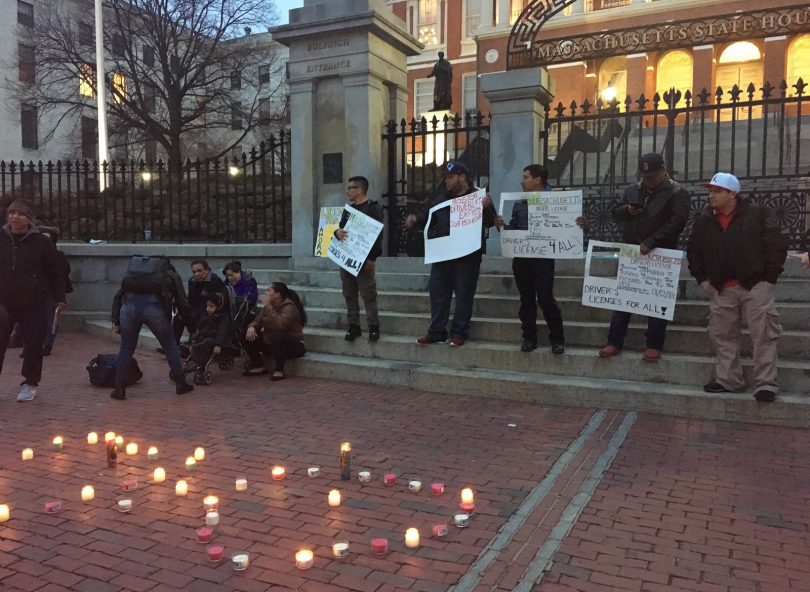By Mariana Sánchez Gaona
BU News Service
BOSTON — Geovani Alvarez looks through his window onto his quiet street in Boston’s Roslindale neighborhood. The curtains allow him to see outside, but only a silhouette of a medium height man would be discernible from the street. He waits for me, a stranger, to walk through the door of his third-floor apartment before he moves from the
Alvarez immigrated from Guatemala 13 years ago. He used to be his own boss back in his home country. He drove trucks for a living, but after two of his close friends, who were also businessmen, were killed by the gangs, he decided to leave. The gangs demanded fees for people to work in exchange for protection — against the same gangs.
“They demanded
Migrants from Central America’s Northern Triangle (El Salvador, Guatemala and Honduras), often “cite violence, forced gang recruitment and extortion, as well as poverty and lack of opportunity, as their reasons for leaving,” according to the Council of Foreign Relations.
Alvarez came into the United States through the southern border on his second attempt. When he got to McAllen, Texas, he says, he walked for days to get to a town in Texas where people took Alvarez in, fed him, and even gave him money to get to Massachusetts.
He now works in a restaurant. “It’s one of the places where people like us get an opportunity to work,” Alvarez said. “Anywhere else, they’ll ask you for a social security number.”
Alvarez and his wife, Amarilys Mayen, who used to date in Guatemala, reconnected through Facebook in 2010. They started a long-distance relationship, and she came to the U.S. with her son in 2011. Alvarez and Mayen, like many people from Latin America, have two given names and two surnames. They are referred to in this story by their less-used second names.
Now, she thinks the family’s immigration status has taken a toll on her teenage son. “He feels like he won’t have a lot of opportunities to go to college. I see him a little discouraged in school,” she says. “It has affected him to know that if he graduates from college he won’t have a good job because of his status.”
Alvarez feels constant fear, even when driving to work. He could be detained for driving without a license and eventually deported. Alvarez and Mayen talked to lawyers to inquire about legal residency, but their case is not promising. They can’t seek asylum. “If you want to ask for asylum in the U.S., you have a year after you arrived in the country,” immigration lawyer Janeth Moreno says.
If Alvarez is threatened with deportation, he could argue that it would cause his family extreme emotional distress because he’s the main economic support for them. However, Moreno says, if no one in the family has papers, there would be no relief for them.
Immigrants from the Northern Triangle living in Boston lead their lives like any other resident. But their burdens fall from going to night school to learn English, to being deported and separated from their families. No matter their status, they are working toward more rights that could bring them a normal life in the United States.
At the end of March, President Donald Trump announced his intention to divert $450 million of aid to Guatemala, El Salvador and Honduras, a measure he claimed would deter immigration from those countries. The impact of the aid sent to these three countries has been favorable, according to The New York Times. The Times said the programs, which might be affected by cutting off aid, help to “prevent violence, curb extreme poverty and hunger, and strengthen the justice system.”
But Central America Policy Advisor for Oxfam America, Vicki Gass, told the Associated Press that the decision would “waste U.S. taxpayer dollars that have already been invested” and “foster the same instability that is making people flee in the first place.”
The history of the United States and Central America includes coups, support for regimes, training death squads, and relocation of Los Angeles gangs to the Northern Triangle. “We see the forced migration of Central Americans to the United States as a logical consequence of the country’s foreign policies imposed over decades in the region,” Centro Presente director Patricia Montes, says.
Centro Presente gives basic legal services and an English as a Second Language program. They also look to make political impact and empower immigrants, mostly from Central America. Many other organizations help immigrants to adapt to their new life in the U.S. They teach English, introduce them to lawyers for them to know their rights, advance their careers with computer classes or help them navigate the public school system for their children.
–
Outside the Massachusetts State House in a cold April night, people assemble for a vigil organized by Cosecha, an organization that supports immigrant movements in the United States, for the national campaign “Manejando sin Miedo” (Driving without Fear). The campaign advocates for undocumented people to apply for a driver’s license. People gather around a table where food and coffee are being served. Two hearts made of small candles are in front of the State House’s closed gate. Signs made in white cardboard paper imitate a driver’s license with a hole cut out where the photograph should be. Music in Spanish plays before the first speaker of the night
Ericka Arévalo, the 38-year-old spokesperson of the organization Cosecha, lights the small candles that make the two hearts on the floor. She’s from El Salvador, and was a journalist back in her country of origin. “We know our community has a great need for a driver’s license for driving their kids to school, to a doctor’s appointment, trips or going to work,” Arévalo said. According to Arévalo, the measure will also help ease the community’s fear of being deported after being detained for driving without a license. This type of detention could lead to coordination with Immigration and Customs Enforcement to start deportation proceedings.
“I’m always here fighting, waiting for the dream to have a license,” said Tomas Cas, sitting by the steps of the State House. A Salvadorian, he said that poverty brought him to the United States. He crossed Mexico by bus at times and walked the rest.
“I can’t complain about my life here,” he says. “I’ve done well. I know that sometimes people closed their doors to us for being undocumented. But I thank God that everything else is fine.” Cas says he is afraid of being deported because he economically supports his younger brothers and parents. “It would be a very big failure to return to my country like that, to fall again in the same situation,” the 28-year-old said. He works in construction even though he believes the work is exploitative, because the pay is good.
The construction industry employs 15% of the undocumented immigrant workforce with 1.35 million unauthorized workers, according to The New York Times. The Boston Globe reported that “these workers, eager for a paycheck, are often paid below the prevailing wage and illegally, in cash.” The Globe found that they are likely to work in unsafe conditions, and without insurance, which could help cover their medical bills if they get injured.
–
The Mario Umana Academy K-8 in East Boston serves as an adult education school, the East Boston Harborside Community School, after three o’clock. The long hallways and ample classrooms are quiet after regular hours. A classroom built for around 30 sixth-graders is occupied by ten Spanish speaking adults of different ages, studying the third and last level of an English for Speakers of Other Languages class.
Carlos López sits in front of the classroom working on the exercises while the teacher with a trace of a Bosnian accent explains the difference between the present perfect and present perfect continuous verb tenses. López stays behind after many students have left, reworking on his exercise of writing a thank-you email after a job interview. The teacher crouches by his side to hear him read his second attempt and congratulates him.
López arrived in the country more than a year ago. For the 30-year-old Salvadorian, living in the U.S. has been a long time coming. He had to wait in his home country for seven years before he received the U.S. government’s permission to immigrate to Massachusetts. His mother, who has a legal status, petitioned for her son to enter the country under a visa for unmarried adult children. The candidates go through a rigorous background check in their home countries that could take years.
“In my country, I was a dentist,” Lopez said. He now works for a company that makes water filters. “That’s what has been terrible for me. Coming from a professional background I feel like I’m nothing here.” He hopes to improve his English so he can practice dentistry again.
“If I can’t practice anymore, I would likely return back to my country,” Lopez said. “When you have a career, it is very difficult to leave behind all the time and effort you put into your career.”
Lisa Garone, the program coordinator for the ABCD Adult ESOL Program, said one of the biggest challenges immigrants face when they come to the U.S. is that they’ll have to work almost immediately, and the English language can be a barrier. Sometimes students work multiple jobs or their shifts might vary, so it is difficult for them to attend classes.
“I wish the American children who sometimes don’t want to go to school could see how the opportunity of school is so desired by the immigrants who come to our country,” Education Program Director of the Community School Carol Baglio said.
–
Jerry Hernández, a happy and easy-going 22-year-old, stops by the classroom next door to say hello to his former English teacher. He crossed the border when he was still a minor. Like Alvarez, Hernández’s eyes go blank when talking about his trip from El Salvador to the U.S. “What I saw was horrible,” Hernández says. He took one of the trains called “The Beast” that go through Mexico, then crossed the desert and the river.
But unlike Alvarez, he has a strong legal case in the courts because he was an unaccompanied minor when he entered the country. Hernández worked his way up as a waiter, and one requirement for his current position was to speak English. Even though he would prefer to be at home right now instead of in class, he knows he has to make an effort to pursue his dreams.
“In the short term, I’d like to be a nutritionist and a trainer. I’d need an English certificate for that. But in the long term I want to be a lawyer,” Hernández says. “I like that in this country you can pick yourself up. You have to put in the work, but it will be rewarded.”
Most of the education and legal services for immigrants, if you have a case for legal residency, are known by word of mouth in the Hispanic immigrant community. Attorney Janeth Moreno says is very important for immigrants to seek out legal advice about their case and gain a better understanding of the legal immigration system.
“When we go to the community it is very powerful just to provide them with basic information to know their rights,” Moreno said. “Sometimes the deportation officers can be very intimidating, and they can tell you there is nothing here in the U.S. for you, you’re going to be removed anyway, just sign these documents. And if you do it without knowing what you’re signing for, you could be signing an expedited removal order.”
Alvarez and Mayen know their situation is difficult. But like many other immigrants, they remain hopeful.
“People get used to the lifestyle in the U.S. I don’t mean having money and luxuries,” Mayen says. “The lifestyle I’m talking about is to live peacefully without so much crime or corruption. You know that the police in this country are here to protect you. You can let your child take public transportation or go to school alone. You can use your cellphone in the streets, take your laptop out in the train, without [it] being stolen.”
Leaving their dreams behind is a small price for walking the streets of Boston with relative safety. Alvarez drove a truck in Guatemala. He doesn’t like being enclosed in a kitchen for eight hours. “I missed that life of adventures,” he says. His passion for driving was born when he was a kid, “my wings were cut when the extortion started” in his country.
“We hope for one day there would be an immigration reform so we can step outside of the shadows in which we live in,” Alvarez said. As I leave his home with white walls and few decorations, Alvarez returns to his spot by the window, more out of habit than being cautious.








